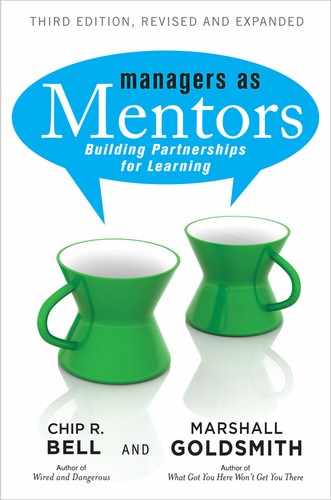16
Reporting on Blind Spots
The Gifts of Feedback and Feedforward
Honest criticism is hard to take, particularly from a relative, a friend, an acquaintance, or a stranger.
Franklin P. Jones
Ken Blanchard is credited with labeling the word “feedback” as the “breakfast of champions.” Ken was giving us more than a clever sound bite by borrowing from the tagline from the familiar Wheaties® cereal ad. When you dissect the word into its parts—“feed” and “back”—you get the intended connotation of feedback as a tool for nurturing wisdom. Think of it as learning fuel. And given that breakfast is the most important meal of the day, the symbolism is far more significant than calling it the “supper of champions.”
How do you give feedback intended to fuel growth? Start by recognizing that, while giving advice can surface resistance, giving feedback can stir up resentment. Advice is about expanding the scope of knowledge; feedback is about filling a blind spot. We’ll illustrate with a true-life experience.
In the late sixties, Chip served in Vietnam as an army infantry unit commander with the 82nd Airborne. Attached to his combat unit was an artillery officer who worked as the forward observer (FO) for the artillery unit that supported field operations in the rear area. This FO essentially served as the eyes for the gunner pulling the lanyard on the artillery piece. As rounds were fired several miles out, the FO observed their impact and, using a field radio, called back corrections to improve the accuracy of the next artillery shot.
The FO never responded with, “Lousy shot,” or, “Well, that was better than last week.” He would simply say, “Drop one hundred meters,” or “West one-fifty,” or “Pay dirt!” This was feedback, not advice; the FO had a perspective the gunner needed and did not have.
There is one key difference between artillery feedback and mentoring feedback: artillery feedback is not likely to make the recipient angry. Advice is expertise the protégé may have or could acquire. Resistance to advice is therefore about premature smartness—that is, “You (the mentor) are telling me (the protégé) something you know that, in time, I might learn on my own.” But with feedback, the issue is this: “you (the mentor) are telling me something you know that I (the protégé) will never learn on my own, and that irritates me.” The danger with advice is potential resistance; with feedback, it is potential resentment.
“But what about confirming feedback?” you may be thinking. “Surely protégés won’t resent feedback that communicates that their efforts are on target.” To the protégé, however, such well-intentioned confirmation can seem patronizing. The unspoken reply to your “This report you wrote is complete and effective” may be “What gives you the right to tell me this?”
We have an acquaintance who is legally blind. She is in no way self-conscious about her special challenge. At a dinner party, a close friend asked her, “What is the hardest part about being blind?” She replied, “When people assist me, I sometimes cannot tell if the help is for my preservation or their pretension.” Confirming feedback should contain the same level of care as corrective feedback.
